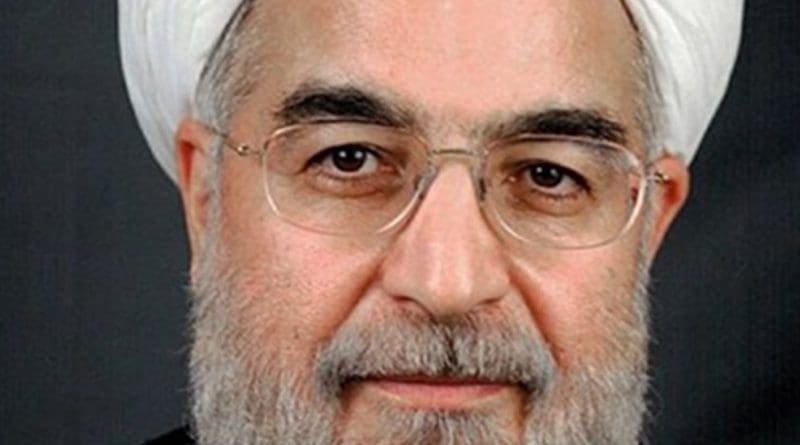Economic Diplomacy: Iran’s New Window To Foreign Relations – OpEd
By Iran Review
By Hossein Kebriaeezadeh*
Following the election of the 11th Iranian administration and after being denied access to a large part of global economy and markets during past years as a result of the West’s unilateral sanctions, the country has put on its agenda the approach of constructive interaction with the world based on mutual respect. This constructive interaction, which started with the nuclear talks, has rapidly spread to the national economy, so that, improvement in Iran’s economic interactions with the world started through arrival of foreign economic delegations, especially from Europe, right after the conclusion of Iran’s nuclear deal with the P5+1 group of countries, which is also known as the Joint Comprehensive Plan of Action (JCPOA).
Earlier, under the administration of former Iranian president, Mahmoud Ahmadinezhad, due to economic isolation as a result of international sanctions against the country, Iran had taken a long-term approach to formulate substitute frameworks for its economy by building new financial and trade networks and attracting investments from non-Western countries. Iran tried to achieve this goal through the expansion of cooperation with countries in East and Southeastern Asia as well as Africa and Latin America in what was considered a “look to the East” policy. However, Tehran could not even get close to achieving its economic goals after it was locked out of global monetary and financial transactions network and also due to limited capacity of Iran’s new friends.
Therefore, President Hassan Rouhani’s administration formulated its economic diplomacy on the basis of two domestic variables, namely, social and economic needs as well as geopolitical requirements of the country, in addition to two foreign variables, that is, the structure of international political system and attention to threats and opportunities in this sphere. In doing so, the new Iranian administration tried to steer the country’s economic security and sustainable stability at all personal, social and national levels – which had been weakened as a result of sanctions – toward a balanced state by increasing cooperation and improving relations with other countries.
Synergism and guaranteeing constructive political relations through expansion of economic and trade relations with powerful countries need new approaches to globalization in order to reduce vulnerabilities of Iran’s oil-dependent economy to the lowest level possible. In this regard, since the world economic order is in transition from a state of globally centralized economy toward a multilateral global economy, the strategy devised by Rouhani’s administration in this field is a development-oriented approach to foreign policy and international relations based on improvement and enhancement of economic relations with those countries, which can meet Iran’s political and economic interests. Therefore, presence in international financial and monetary markets, taking advantage of geopolitical capacities, and bolstering the role of the private sector in the country’s foreign relations are of special importance in this regard.
The precondition for such an approach is having regulated relations with big powers because these actors can have the greatest effects on the process of economic development in Iran from both positive and negative viewpoints. This issue is also directly related to the quantity and quality of how Iran takes advantage of international potentials in order to achieve its national goals. In the meantime, foiling obstacles created by the United States on the way of Iran’s effort to establish scientific and technological contacts with global hubs of science, in addition to facilitation and attraction of investment from rich countries are very significant.
The economic diplomacy adopted by China, could be specifically helpful for Iran. Since 1978 and by taking advantage of diverse and effective tools in its foreign policy, Beijing has been able to not only overcome obstacles created by Washington, but also take advantage of the United States’ potentials in order to energize its own economic growth. As a result, since the late 1970s up to the present time, the United States has been the biggest foreign investor in China and one of the biggest markets for Chinese products as well.
In line with this policy, establishment of stable economic and political relations with the European Union and its member states can be considered a good option for Iran in view of those countries’ vast capacities with regard to various aspects of power. This is especially true because unlike other major centers of power in the world, the European Union enjoys high capacity for bargaining in political and economic fields and can be considered a suitable catalyst to elevate the level of Iran’s economic interactions in the world. This is why visits to Tehran by big delegations from Germany, Italy, France, Austria and so forth, as well as reciprocal visits to European countries by Iran’s economic delegation in the coming weeks are indicators that Iran gives priority to economic diplomacy.
Of course, interaction with the West and progress in economic negotiations with European countries should not bar Iran from getting access to emerging and high-capacity markets in the region because despite special restrictions in this field and Iran’s negative memories of political and economic ties with its neighbors during eight years of war (between Iran and Iraq), this issue has been already proven its importance to Tehran. Iran can forge some sort of mutual dependence with its neighbors in various economic fields, including energy, transit, water sector, institutionalized economic interactions and so forth. In the meantime, Iran’s presence and role in regional and transregional mechanisms such as the Organization of Islamic Cooperation and the Non-Aligned Movement should be highlighted.
* Hossein Kebriaeezadeh
Expert on Middle East Issues

